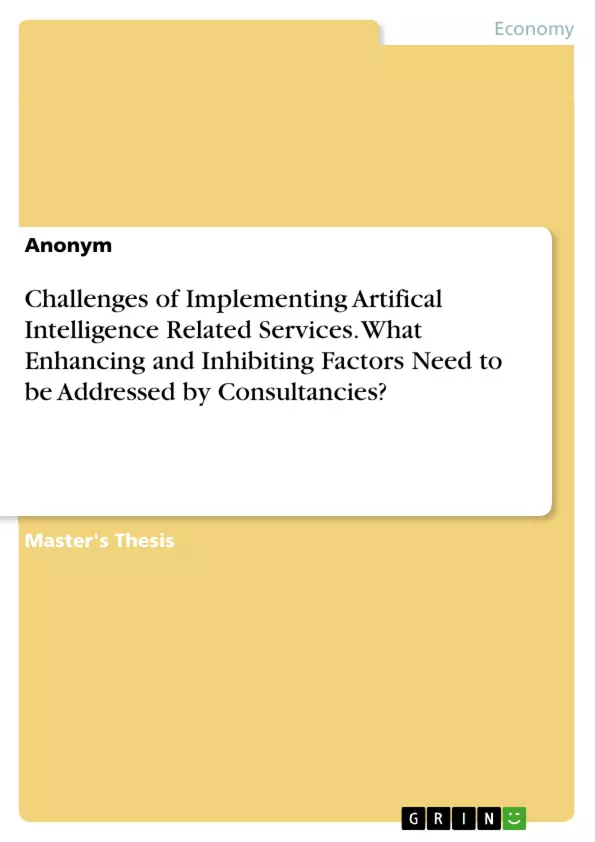This thesis seeks to explore the enhancing and inhibiting factors consultancies have to address when implementing services related to artificial intelligence.
To address the discussion of current research, whether AI is an enhancing or a disruptive innovation, the author compares the answers to the research question with existing literature on service innovation. He aims to show whether AI requires a different innovation process than other service innovations.
Firstly, the literature review addresses the theoretical background of this study by discussing literature on service innovation capabilities. Hereby, in particular, the factors that are associated to contribute as enhancing factors. Secondly, the methods section outlines the approach of the research design, data collection and data analysis. Thirdly, in the results section, the results of the study are presented, compared with the existing literature and placed in the discussion of the existing literature.
Finally, in the discussion section, the results, their implications for service innovation theory and consultancies in practise are discussed. The research concludes with its limitations and the potential areas for future research.
Inhaltsverzeichnis (Table of Contents)
- Abstract
- Introduction
- Literature review
- Capabilities for knowledge-based service innovations
- Competence enhancing and disruptive technologies
- Methods
- Research design
- Sampling approach
- Data collection
- Data analysis
- Findings
- Relevance perception of Artificial Intelligence
- Client projects supported by Artificial Intelligence
- Determinants for enhancing AI capability development
- Determinants for inhibiting AI capability development
- Critical remarks on internal AI capability development
- Discussion
- Theoretical contribution
- Practical implications
- Limitations and future research
- REFERENCES
Zielsetzung und Themenschwerpunkte (Objectives and Key Themes)
This master thesis investigates the factors that enhance and inhibit consultancies in their implementation of Artificial Intelligence (AI) related services. The research aims to address the debate surrounding AI in the consulting industry, exploring whether AI is a disruptive force or merely an enhancement to existing competencies. The thesis seeks to identify the specific capabilities needed for consultancies to develop and utilize AI effectively.
- The impact of AI on the consulting industry, specifically its potential for disruption or enhancement of existing capabilities.
- The development and implementation of AI-related services by consultancies.
- The identification of enhancing and inhibiting factors for AI implementation within consultancies.
- The comparison of AI-related service innovation capabilities with those of other service innovations.
- The theoretical and practical implications of the findings for the consulting industry.
Zusammenfassung der Kapitel (Chapter Summaries)
The research begins with a comprehensive review of existing literature on service innovation, specifically focusing on knowledge-based service innovations and the role of disruptive and enhancing technologies. The research design and methodology are outlined, detailing the sampling approach, data collection, and data analysis methods. The research findings are presented, analyzing the perception of AI relevance within consultancies, examining client projects supported by AI, and identifying the determinants for enhancing and inhibiting AI capability development.
Schlüsselwörter (Keywords)
This master thesis focuses on Artificial Intelligence (AI), service innovation, consulting industry, competence development, disruptive technologies, enhancing technologies, data analytics, and client engagement.
Frequently Asked Questions
Is Artificial Intelligence considered a disruptive or enhancing innovation in consulting?
The research explores this debate, investigating whether AI fundamentally disrupts the consulting business model or serves as a tool to enhance existing professional capabilities and service offerings.
What are the main factors inhibiting AI implementation in consultancies?
Inhibiting factors often include a lack of specialized data science skills, resistance to organizational change, data privacy concerns, and the high initial investment required for AI infrastructure.
Which factors enhance the development of AI capabilities?
Key enhancers include strong leadership support, a culture of continuous learning, access to high-quality data, and strategic partnerships with technology providers.
Does AI require a different innovation process than other service innovations?
The study compares AI-related service innovation with traditional knowledge-based services to determine if the data-driven nature of AI necessitates unique development cycles and capabilities.
What are the practical implications for consulting firms?
Consultancies must focus on building internal AI literacy, redefining client engagement models, and addressing the ethical implications of automated decision-making to remain competitive.
- Citation du texte
- Anonym (Auteur), 2019, Challenges of Implementing Artifical Intelligence Related Services. What Enhancing and Inhibiting Factors Need to be Addressed by Consultancies?, Munich, GRIN Verlag, https://www.grin.com/document/494307



